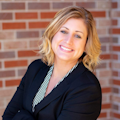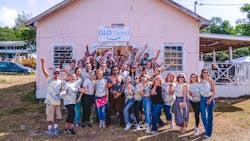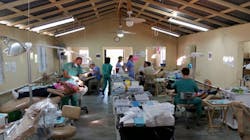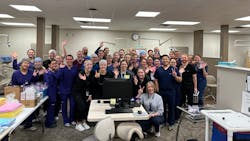Dental hygienists give back in a variety of ways
Throughout the US and the world, dental hygienists enjoy giving back. We have a passion for recognizing needs within communities, collaborating, and helping others who need our skills. Here are the stories of three hygienists who plan and participate in events that make a difference in many lives. Thank you to Jessica Machado of New York City, Andrew Johnston of Tampa, Florida, and Pam Entorf of Eau Claire, Wisconsin, for sharing their stories!
Related reading
Veteran of charity trips shares tips on getting involved with dental missions
Volunteering: An unexpected way to market your dental practice
Jessica Machado, RDH, and the GLO Good Foundation
In December 2022, GLO Good, in partnership with JBL NYC, Twice, and Lenny Kravitz’s Let Love Rule Foundation, returned to Gregory Town, Eleuthera, Bahamas, for its sixth dental and medical mission. A team of nearly 100 volunteers set up a seven-day clinic to provide free dentistry and primary medical care for hundreds of adults and children.
The GLO Good Foundation volunteers are a world-class group of specialists that include general dentists, prosthodontists, pediatric dentists, endodontists, oral surgeons, hygienists, dental assistants, lab technicians, nurse practitioners, nutritionists, meditation and wellness coaches, chefs, maintenance and operations personnel, administrative personnel, and more.
Jessica serves a critical role in coordinating everything for this annual mission. She gathers supplies, coordinates volunteer lodging, food, and transportation, and works on-site to make sure everything runs smoothly so as many patients as possible can be treated with quality and safe care. Find out more about this event at glogoodfoundation.
Andrew Johnston, BSBM, RDH
How much does it cost?
“One trip costs $300 plus airfare. So, it’s a little less than $1,000 for a week-long trip. We do not stay in name-brand hotels, but the clinic is amazing and worth it. The other trips can cost in the range of $1,500 to $3,500, depending on location.”
What does someone need to bring?
“Some trips ask you to round up donations; my favorite group does not require us to bring anything but has a suggested items list if we want to donate things.”
What if someone doesn't speak the language?
“I will tell you that my limited high school Spanish courses helped me very little. The great thing is that there are usually people who can help, whether it’s local members of the group who are bilingual or other volunteers. One group even had basic dental Spanish and Haitian Creole phrases posted next to the chairs for us to use.”
Do you recommend trips local or abroad?
“This is something only you can answer. There is a huge need in local communities for access to dental care, and you have the power to effect change here. Alternatively, there are very few resources in other parts of the world with the understanding that even trained dental professionals are several years if not decades behind the accepted practices. They need help too.”
What’s your favorite group?
“I am very partial to Somos Amigos, and there is a podcast episode with them at a Tale of Two Hygienists. They are affordable, they include the community in their decision-making, they have regular trips to the same community, and their dental space is among the most advanced I’ve ever used abroad, with real chairs, lights, suction, air/water syringe, Cavitron, and more.”
Andrew also said, “Each trip looks and feels very different. The results are exactly what I need. I feel refreshed. I feel like I am empowered to use all my education and skills to help someone heal. It’s a nice break from insurance codes, and it renews my passion for helping my patients here at home.”
Pam Entorf and Chippewa Valley Technical College
Program director Pam Entorf established Give Vets a Smile Day eight years ago, modeled after the college’s Give Kids a Smile Day, to provide free dental services to veterans in Wisconsin’s Chippewa Valley.
Pam said, “The event has now grown to include not only dental hygiene students and volunteer dental professionals, but respiratory therapists, nurses, physical therapy assistants, health information technologists, barber and cosmetology students, and radiography students, as well as the faculty for these programs.
“This interprofessional model allows students from different programs to work together to provide a variety of services for veterans, who can get haircuts, chair massages, physical evaluations, blood pressure and glucose screenings, and education from nursing students and respiratory therapy students about various health issues. Oral surgery is one of the main services requested.”
Dental hygiene services are provided by dental hygiene students, past graduates, and faculty. Pam says, “This has become one of our favorite community events, and the support from the college has been amazing.” Find out more about this event.
About the Author

Megen Elliott, MS-OCL, RDH, CDA
Megen Elliott, MS-OCL, RDH, CDA, has more than 14 years of experience in the dental field. She’s an educator, author, interprofessional speaker, volunteer leader, and consultant. Megen is the program director of the dental assistant program at Northwood Technical College in Rice Lake, Wisconsin, where she’s also a faculty member. She’s a consultant with dental organizations and individuals, through talent acquisition and project management. Megen’s enjoys networking with dental colleagues online and at conferences. As the founder of Hygiene Happy Vibes, she encourages building each other up.
Updated October 24, 2022




